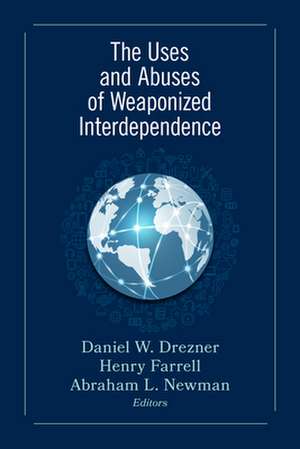The Uses and Abuses of Weaponized Interdependence
Editat de Abraham L. Newman, Daniel W. Drezner, Henry Farrellen Limba Engleză Paperback – mar 2021
Until recently, globalization was viewed, on balance, as an inherently good thing that would benefit people and societies nearly everywhere. Now there is growing concern that some countries will use their position in globalized networks to gain undue influence over other societies through their dominance of information and financial networks, a concept known as "weaponized interdependence."
In exploring the conditions under which China, Russia, and the United States might be expected to weaponize control of information and manipulate the global economy, the contributors to this volume challenge scholars and practitioners to think differently about foreign economic policy, national security, and statecraft for the twenty-first century. The book addresses such questions as: What areas of the global economy are most vulnerable to unilateral control of information and financial networks? How sustainable is the use of weaponized interdependence? What are the possible responses from targeted actors? And how sustainable is the open global economy if weaponized interdependence becomes a default tool for managing international relations?
Preț: 276.91 lei
Nou
Puncte Express: 415
Preț estimativ în valută:
52.99€ • 55.87$ • 44.11£
52.99€ • 55.87$ • 44.11£
Carte disponibilă
Livrare economică 21 decembrie 24 - 04 ianuarie 25
Livrare express 07-13 decembrie pentru 37.16 lei
Preluare comenzi: 021 569.72.76
Specificații
ISBN-13: 9780815738374
ISBN-10: 0815738374
Pagini: 352
Dimensiuni: 152 x 229 x 21 mm
Greutate: 0.5 kg
Editura: Rowman & Littlefield
ISBN-10: 0815738374
Pagini: 352
Dimensiuni: 152 x 229 x 21 mm
Greutate: 0.5 kg
Editura: Rowman & Littlefield
Cuprins
Contents:
1. Introduction: The Uses and Abuses of Weaponized Interdependence, Daniel W. Drezner
Part I: Theory 2. Weaponized Interdependence: How Global Economic Networks Shape State Coercion, Henry Farrell and Abraham L. Newman
3. Hegemony and Fear: The National Security Determinants of Weaponized Interdependence, Michael Mastanduno
4. The Road to Revisionism: How Interdependence Gives Revisionists Weapons for Change, Stacie E. Goddard
Part II: Finance
5. Weaponized Interdependence and International Monetary Systems, Harold James
6. Weaponizing International Financial Interdependence, Thomas Oatley
Part III: Tech
7. Internet Platforms Weaponizing Choke Points, Natasha Tusikov
8. Huawei, 5G, and Weaponized Interdependence, Adam Segal
Part IV: Energy
9. Weaponizing Energy Interdependence, Emily Meierding
10. Russia's Gazprom: A Case Study in Misused Interdependence, Mikhail Krutikhin
Part V: State-Owned Networks
11. Weaponized Weapons: The U.S. F-35 and European Eurofighter Networks, Florian David Bodamer and Kaija E. Schilde
12. Coercion Unbound? China's Belt and Road Initiative, Thomas P. Cavanna
Part VI: Responses to Weaponized Interdependence
13. Weaponized Interdependence, the Dynamics of Twenty-first Century Power, and U.S. Grand Strategy, Bruce W. Jentleson
14. Investment Screening in the Shadow of Weaponized Interdependence, Sarah Bauerle Danzman
15. Weaponized Interdependence and Human Rights, Charli Carpenter
16. Must the Weak Suffer What They Must? The Global South in a World of Weaponized Interdependence, Amrita Narlikar
17. Weaponized Interdependence and Networked Coercion: A Research Agenda, Henry Farrell and Abraham L. Newman
Contributors
Index
1. Introduction: The Uses and Abuses of Weaponized Interdependence, Daniel W. Drezner
Part I: Theory 2. Weaponized Interdependence: How Global Economic Networks Shape State Coercion, Henry Farrell and Abraham L. Newman
3. Hegemony and Fear: The National Security Determinants of Weaponized Interdependence, Michael Mastanduno
4. The Road to Revisionism: How Interdependence Gives Revisionists Weapons for Change, Stacie E. Goddard
Part II: Finance
5. Weaponized Interdependence and International Monetary Systems, Harold James
6. Weaponizing International Financial Interdependence, Thomas Oatley
Part III: Tech
7. Internet Platforms Weaponizing Choke Points, Natasha Tusikov
8. Huawei, 5G, and Weaponized Interdependence, Adam Segal
Part IV: Energy
9. Weaponizing Energy Interdependence, Emily Meierding
10. Russia's Gazprom: A Case Study in Misused Interdependence, Mikhail Krutikhin
Part V: State-Owned Networks
11. Weaponized Weapons: The U.S. F-35 and European Eurofighter Networks, Florian David Bodamer and Kaija E. Schilde
12. Coercion Unbound? China's Belt and Road Initiative, Thomas P. Cavanna
Part VI: Responses to Weaponized Interdependence
13. Weaponized Interdependence, the Dynamics of Twenty-first Century Power, and U.S. Grand Strategy, Bruce W. Jentleson
14. Investment Screening in the Shadow of Weaponized Interdependence, Sarah Bauerle Danzman
15. Weaponized Interdependence and Human Rights, Charli Carpenter
16. Must the Weak Suffer What They Must? The Global South in a World of Weaponized Interdependence, Amrita Narlikar
17. Weaponized Interdependence and Networked Coercion: A Research Agenda, Henry Farrell and Abraham L. Newman
Contributors
Index
